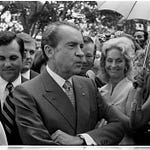
We often hear that land doesn’t vote; people do.
How about a different perspective?
Land doesn’t have rights, but land endows rights.
What would repealing Birthright Citizenship mean?
We often hear that “land doesn’t vote; people do.” This phrase highlights the humanity of our democratic republic. The adage emphasizes rights of the individual and the collective power of the electorate to shape governance and policy. But, the viewpoint oversimplifies the intertwined relationship between people and the soil.
Land doesn’t have rights, but land endows rights. Geographical boundaries and birthplaces shape individual rights, demonstrating the enduring influence of the land on our legal and societal frameworks.
The Latin Jus soli, or the right of the soil, is a cornerstone of our legal and societal frameworks. It grants individuals a national identity rooted in their birthplace.
Our Constitution establishes rights granted to all Americans by the soil, including rights of citizenship, representation, and national service.
This connection between land and individual rights becomes especially clear when we consider the legal foundations of citizenship in America. Citizenship’s roots grow into this concept of the soil.
Citizenship
Citizenship in America is founded on jus soli, the right of the soil, and jus sanguinis, the right of blood. The right of the soil carries into the right of blood.
Wong Kim Ark was born in San Francisco in 1870 to Wee Lee and Wong Si Ping. The couple were not American citizens and had no path to citizenship; they returned to China when Wong was eight.
In August 1895, at the age of 24, Wong made a return trip to San Francisco with papers certifying his identity and legal standing as a citizen born on American soil. US customs official John H. Wise denied Wong’s entry on the grounds of the 1882 Chinese Exclusion Act and the 1880 Angell Treaty between the US and Qing Dynasty China, which recognized America’s ability to restrict Chinese immigration. Wise ordered Wong deported.
Wong appealed the decision and remained on shipping vessels for several months off the coast of California. In 1897, the US Supreme Court heard his case. In United States v. Wong Kim Ark (1898), the court found Wong to be an American citizen on the grounds of the 14th Amendment’s first clause: "All persons born or naturalized in the United States, and subject to the jurisdiction thereof, are citizens of the United States and of the State wherein they reside."
During deliberation, the court found Wong was born in the US. Further, though his parents were subjects to the Emperor of China, they were not “employed in any diplomatic or official capacity under the Emperor of China.” The court affirmed that Wong was subject to US jurisdiction at birth and thus a citizen by virtue of the 14th Amendment.
United States v. Wong Kim Ark upheld the principle of the right of the soil for determining citizenship. It firmly clarified that children born in America to foreign citizens are US citizens, even if their parents have no allegiance to America. The Supreme Court's decision established a broad interpretation of the 14th Amendment. It ensured that the vast majority of children born on American soil are entitled to citizenship, regardless of their parents' nationality. Though the fight for equal treatment of Asian Americans continued well past Mr. Wong, this ruling has had a lasting impact on immigration and citizenship policies.
Jus soli grants citizenship to all born on US soil and carries through blood. The right of blood extends the right of citizenship across borders, allowing children born abroad to American citizens to inherit their citizenship. This dual foundation reflects a comprehensive understanding of national belonging—rights rooted in the physical land of America that reach through the blood to extend the inalienable rights to those born to American parents worldwide.
Just as jus soli grants citizenship, it also confers the right to participate in our democratic republic. This extension of rights from the land empowers us as participants in the national discourse.
Representation
The 14th Amendment is not the earliest affirmation of the right of the soil in the Constitution. The first reference to the premise that soil endows citizens with rights is earlier than even the Bill of Rights.
Specifically, Article II, Section 1 of the US Constitution identifies, “Each State shall appoint, in such Manner as the Legislature thereof may direct, a Number of Electors, equal to the whole Number of Senators and Representatives to which the State may be entitled in the Congress…”
This section was later amended by the 12th Amendment after some drama in the 1796 and 1800 elections. It forms the basis of the Electoral College, which grants individuals the right to representation in national elections. By ensuring that residents' votes in each state contribute to the national outcome of presidential elections, the Electoral College grants them a meaningful role in the democratic process.
The Constitution achieves this by guaranteeing that every state has a certain number of electors, regardless of population. This system grants "rights" or influence to regions, paralleling how jus soli grants citizenship rights to individuals born on US soil.
Just as the right of the soil grants citizenship, it also guarantees that each geographic state has a say in national elections. Because land doesn’t vote, the Constitution extends this guarantee to the voters in each state.
“Land doesn’t vote; people do” is a misconception. The statement overlooks how the Electoral College system carefully balances geographic diversity and population. The system allocates votes in a manner that accounts for geographic distribution, thereby preventing larger population states from completely dominating national elections. It also supports the underlying principle of our democratic republic—every vote is an expression of an individual's choice, and all states have a voice in national elections.
In short, land doesn’t bestow on Americans the right to vote; it grants people from each state influence in national elections, no matter how small the state. Elected representatives from all states ratified both the US Constitution and the 12th Amendment. Therefore, every American agreed with the premise that each state has a voice in national elections.
The influence of land on rights extends into the highest offices of national service, reinforcing the critical role that birthplace plays in determining who may lead the nation.
National Service
Serving the nation in any capacity is a privilege. Serving in the highest office is a privilege only available to those who are endowed with the right of the soil.
Article II, Section 1, Clause 5 of the US Constitution states, “No Person except a natural born Citizen…shall be eligible to the Office of President.” If you weren’t born on US soil or with the right of the soil carried into the right of blood, you are ineligible for the nation’s highest office.
The founders included the natural-born citizen requirement to ensure the President would have the deep-rooted allegiance to the United States that only the right of the soil bestows. They believed the requirement would reduce the risk of foreign governments having control over the nation.
Eight Presidents had parents, or both parents, who were not born on US soil. They range from Andrew Jackson, whose parents were both immigrants, to Donald Trump, whose mother was an immigrant. But all Presidents have been natural-born citizens, either born on US soil or to US citizens abroad in an official capacity.
National service is a distinguished honor, especially when it involves leading the country. Only those granted citizenship by the right of the soil or the right of the soil through the blood are eligible. This precedent safeguards the presidency from foreign influence, ensuring the President's loyalty lies firmly with America.
Now for our question: What would repealing Birthright Citizenship mean?
Birthright citizenship isn’t a legal formality. It’s a fundamental cornerstone of American democracy and identity. It ensures that every person born on American soil is a part of the nation's fabric, endowed with the rights and responsibilities that fortify our collective future. Overturning the precedent would lead to a future where many are isolated, disenfranchised, and alienated from the civic body.
Attempting to repeal birthright citizenship would disregard the strong precedent that allegiance to America is gained through the right of the soil.
Some argue that we should repeal birthright citizenship to preserve national identity and ensure we grant citizenship only to those with a provable connection to the United States. But national identity and unity come from commitment to the American ideal, not from repealing birthright citizenship.
Some argue for the repeal of birthright citizenship because children of non-citizens place an undue economic burden on American taxpayers. They cite the costs of public education, healthcare, and other social services. This perspective overlooks the long-term economic contributions of immigrants and their children, who stay in America for generations.
Finally, proponents of repealing birthright citizenship argue it would enhance national security and more effectively control immigration. In fact, it would lead to stateless individuals inside the country, creating a marginalized group that's more vulnerable to radicalization and exploitation. Individuals born on American soil have a clear and immediate stake in the country's future, promoting societal integration and cohesion.
Throughout our discussion, from citizenship to national representation and service, we see a consistent theme: soil bestows rights on Americans.
Our Constitution firmly establishes that we are tied to the soil and the soil through blood. Birthright citizenship is crucial for American identity and the health of our democratic republic.
The Constitution grants individuals rights of citizenship, representation, and national service based on the soil. These rights underscore the importance of soil—whether a specific place of one's birth or the geographic boundaries of states—in defining what it means to be American.
National identity and unity come from shared values and commitments to the American ideal.
What would repealing Birthright Citizenship mean?
Attempting to repeal birthright citizenship would disregard the strong precedent the Constitution establishes: namely, jus soli imprints allegiance on Americans.
May God bless the United States of America.














Share this post